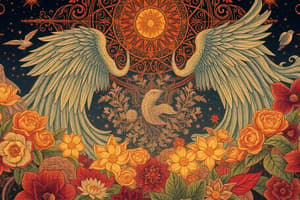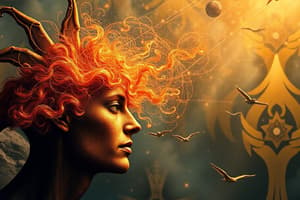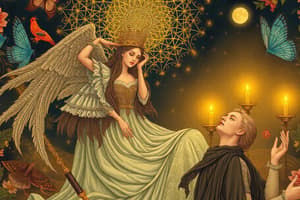Podcast
Questions and Answers
What term describes the shared unconscious ideas among all human beings?
What term describes the shared unconscious ideas among all human beings?
- Shadow
- Collective unconscious (correct)
- Anima
- Persona
Which archetype represents the artificial self that individuals present to society?
Which archetype represents the artificial self that individuals present to society?
- The Hero
- Persona (correct)
- The Mother
- The Wise Man
What archetype represents the nurturing and loving aspect of personality?
What archetype represents the nurturing and loving aspect of personality?
- The Baby
- The Trickster
- The Mother (correct)
- The Shadow
In Jung's theory, which attitude refers to individuals who focus on external activities and social involvement?
In Jung's theory, which attitude refers to individuals who focus on external activities and social involvement?
Which type of personality focuses inward and prioritizes the life of the mind?
Which type of personality focuses inward and prioritizes the life of the mind?
Which archetype is described as the dark and cruel side of human nature?
Which archetype is described as the dark and cruel side of human nature?
Which type of personality makes decisions based on emotional evaluations?
Which type of personality makes decisions based on emotional evaluations?
What symbolizes the self and consciousness in Jung's theory?
What symbolizes the self and consciousness in Jung's theory?
Flashcards
Collective unconscious
Collective unconscious
The part of the unconscious shared by all humans, containing archetypes.
Archetypes
Archetypes
Universal symbols and patterns found in the collective unconscious.
The self
The self
A feeling of wholeness and unity within one's personality.
Persona
Persona
Signup and view all the flashcards
Anima
Anima
Signup and view all the flashcards
Introversion
Introversion
Signup and view all the flashcards
Extraversion
Extraversion
Signup and view all the flashcards
Judging type
Judging type
Signup and view all the flashcards
Study Notes
Carl Jung's Analytical Theory (or Analytical Psychology)
- Jung's theory proposes that all humans share a collective unconscious.
- This collective unconscious contains universal, inherited ideas due to shared evolutionary history and common ancestors.
- The collective unconscious contains archetypes.
Archetypes
- The Self: Represents wholeness, unity, and organization of personality. It is a person's sense of self.
- The Persona: The public self, artificial, conforming to societal expectations. It's the mask or role individuals present to the outside world.
- The Anima: The feminine aspect of a man.
- The Animus: The masculine aspect of a woman.
- The Shadow: The dark, cruel side of an individual, containing animalistic urges and feelings of inferiority. Jung believed the shadow is a source of creativity.
- The Mother: A nurturing and loving figure.
- The Father: A demanding and rewarding figure.
- The Baby: The helpless infant.
- The Man: The strong, aggressive, rational male figure.
- The Maiden: The fair, unspoiled, intuitive female.
- The God: The Almighty, the guiding light.
- The Devil: The embodiment of evil.
- The Wild Man: The untamed primitive, hairy, and dangerous.
- The Trickster: A mischievous figure who plays pranks.
- The Boogie Man: A monster that preys on reckless children.
- The Mandala: A circular symbol representing self and consciousness. Often featuring something holy in the center.
- The Hero: The strong, capable man who saves and protects.
- The Hag: The old, deformed woman who casts spells or makes poisons.
- The Wise Man: The sage, often with a long white beard.
Attitudes: Two Types of Personalities
- Extraverts: Oriented toward the external world, focusing on outward energy. Extraverted individuals channel their energy into activities and social involvements.
- Introverts: Oriented toward the inner, subjective world. Introverted individuals are turned inward, more interested in the life of the mind than outside events.
Rational or Judging Type
- Some individuals use their minds all the time, making conscious value judgments about their directions.
Irrational Type
- These individuals rely on perception and intuition to guide their decision-making. They are present-oriented and more inclined to impulsive behavior.
Rational Type Subtypes
- Feeling Type: Decisions based on emotional evaluations.
- Thinking Type: Decisions based on conscious calculations.
Irrational Type Subtypes
- Sensation Type: Responds to external stimuli, attentive to sensory perceptions. Their actions stem from sensory experiences, which they might struggle to explain.
Studying That Suits You
Use AI to generate personalized quizzes and flashcards to suit your learning preferences.




